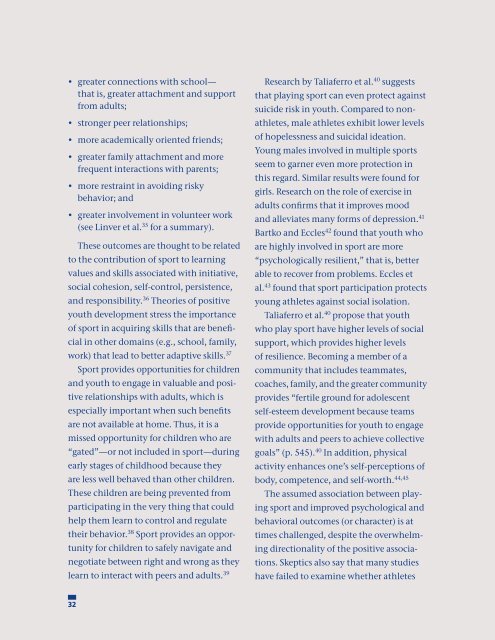True-Sport-Report
Create successful ePaper yourself
Turn your PDF publications into a flip-book with our unique Google optimized e-Paper software.
• greater connections with school—<br />
that is, greater attachment and support<br />
from adults;<br />
• stronger peer relationships;<br />
• more academically oriented friends;<br />
• greater family attachment and more<br />
frequent interactions with parents;<br />
• more restraint in avoiding risky<br />
behavior; and<br />
• greater involvement in volunteer work<br />
(see Linver et al. 35 for a summary).<br />
These outcomes are thought to be related<br />
to the contribution of sport to learning<br />
values and skills associated with initiative,<br />
social cohesion, self-control, persistence,<br />
and responsibility. 36 Theories of positive<br />
youth development stress the importance<br />
of sport in acquiring skills that are beneficial<br />
in other domains (e.g., school, family,<br />
work) that lead to better adaptive skills. 37<br />
<strong>Sport</strong> provides opportunities for children<br />
and youth to engage in valuable and positive<br />
relationships with adults, which is<br />
especially important when such benefits<br />
are not available at home. Thus, it is a<br />
missed opportunity for children who are<br />
“gated”—or not included in sport—during<br />
early stages of childhood because they<br />
are less well behaved than other children.<br />
These children are being prevented from<br />
participating in the very thing that could<br />
help them learn to control and regulate<br />
their behavior. 38 <strong>Sport</strong> provides an opportunity<br />
for children to safely navigate and<br />
negotiate between right and wrong as they<br />
learn to interact with peers and adults. 39<br />
Research by Taliaferro et al. 40 suggests<br />
that playing sport can even protect against<br />
suicide risk in youth. Compared to nonathletes,<br />
male athletes exhibit lower levels<br />
of hopelessness and suicidal ideation.<br />
Young males involved in multiple sports<br />
seem to garner even more protection in<br />
this regard. Similar results were found for<br />
girls. Research on the role of exercise in<br />
adults confirms that it improves mood<br />
and alleviates many forms of depression. 41<br />
Bartko and Eccles 42 found that youth who<br />
are highly involved in sport are more<br />
“psychologically resilient,” that is, better<br />
able to recover from problems. Eccles et<br />
al. 43 found that sport participation protects<br />
young athletes against social isolation.<br />
Taliaferro et al. 40 propose that youth<br />
who play sport have higher levels of social<br />
support, which provides higher levels<br />
of resilience. Becoming a member of a<br />
community that includes teammates,<br />
coaches, family, and the greater community<br />
provides “fertile ground for adolescent<br />
self-esteem development because teams<br />
provide opportunities for youth to engage<br />
with adults and peers to achieve collective<br />
goals” (p. 545). 40 In addition, physical<br />
activity enhances one’s self-perceptions of<br />
body, competence, and self-worth. 44,45<br />
The assumed association between playing<br />
sport and improved psychological and<br />
behavioral outcomes (or character) is at<br />
times challenged, despite the overwhelming<br />
directionality of the positive associations.<br />
Skeptics also say that many studies<br />
have failed to examine whether athletes<br />
32


